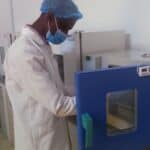-
Asked by Tobias lugwe on 17 Jul 2025.0
Question: State the function of of Bovine somtotrpin
- Keywords:
-
Justa Mwangi answered on 17 Jul 2025:
Bovine somatotropin (bST), also known as bovine growth hormone, is a natural protein hormone that regulates milk production in cows. When administered to dairy cows, it increases milk production, typically by 10% to 20%. This effect is achieved by increasing the partitioning of nutrients towards the mammary gland, leading to increased milk synthesis, according to Quizlet. The synthetic version of bST, known as recombinant bovine somatotropin (rBST), is produced using biotechnology and is used to enhance milk yield.
Here’s a more detailed breakdown:Naturally occurring hormone: bST is a naturally occurring hormone produced in the pituitary gland of cattle, and it plays a crucial role in growth, development, and milk production.
Increased milk production:
When injected into cows, bST stimulates the mammary glands to produce more milk.
Nutrient partitioning:
bST influences how the cow utilizes nutrients, directing them towards milk synthesis rather than other bodily functions, according to ScienceDirect.com.
Recombinant bST (rBST):
This is a lab-created version of bST produced through recombinant DNA technology.
Commercial use:
rBST is used by some dairy farmers to increase milk production, though its use is controversial and banned in some regions.
No significant change in milk composition:
While rBST increases milk production, it generally does not significantly alter the basic composition of milk (fat, protein, lactose, etc.).
Impact on dairy farming:
The use of rBST can lead to increased milk yield per cow, reduced feed requirements, and potentially lower greenhouse gas emissions from the dairy industry.
Latest Questions
-
Is it true that ulcers is caused by stress?
-
Is there any prove that shows there’s existing creatures in other planets in exception of planet earth?
-
After four months of pregnancy, the ovary can be removed and the pregnancy remains still gets sustained to the end of
-
What do arthropologist do as professionals
-
what are the core mission of your organisation
Latest Comments
-
Why has it been difficult to make a vaccine for HIV yet it took a short time to make one for COVID-19? (1 comment)
-
Has the tuberculosis cure been foud (1 comment)
-
How long does a research project take? (1 comment)
-
Does your research help the people and the community (2 comments)
-
the time you got the price how did you feel (1 comment)







Comments